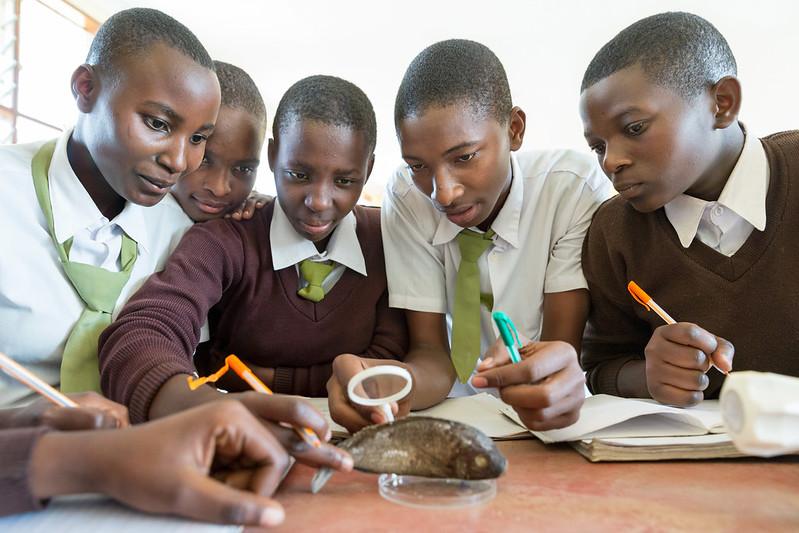
Addressing knowledge gaps, improving access to evidence, and strengthening systems that support the generation and uptake of evidence and innovations in education is important in hastening progress in the Global South. Education systems require more effective teacher training, more gender equity, better learning processes and efficient ways of using evidence to better inform planning in the education sector. It is important to integrate insights across multiple contexts and connect experiences to successful approaches that are emerging within the education sector. In line with the evolving funding landscape in recent years - especially in view of funding for research for development (R4D) - the International Development Research Centre (IDRC) is keen to support egalitarian research that encourages local organisations to be key drivers in knowledge generation, knowledge use and development.
The Global Partnership for Education Knowledge and Innovation Exchange (KIX), mobilizes and strengthens local knowledge on education innovations by bringing together multi-disciplinary actors from the outset such as:
- Educational institutions - including public schools, students, teachers, headteachers and education officers. KIX projects are building on existing knowledge or produce new knowledge and skills while also strengthening the capacity of key stakeholders in education. The goal here is not only to promote knowledge mobilisation at school levels but also the longevity of the expected impact from which governments can benefit for future years.
- Policy makers - Research teams are directly engaging ministries of education and national and sub-national education networks that play important advocacy roles. Alignment with national objectives in the respective countries is assured.
- Local communities - Projects are working with communities to generate knowledge and scaling lessons on topics such as early childhood education, equity and inclusion, access for out-of-school children and quality of learning.
- Civil society organisations, think tanks and other research organizations, and academic institutions headquartered in low- and middle-income countries. These organisations are drawing on existing knowledge and networks to move the evidence produced on scalable initiatives into national policy.
In its third funding phase, KIX has selected 22 regional projects in four KIX regions; East, West and southern Africa, West and Central Africa and the Indian Ocean, Latin America and the Caribbean and Europe, Asia and the Pacific. These projects will contribute to decolonizing knowledge by centering Global South realities and expertise and linking it up with global fora/phenomena. For these sets of projects, KIX is purposefully funding organisations headquartered in low- and middle-income countries to lead this research.
Local organisations as drivers for knowledge generation
For over 50 years, IDRC has supported research organizations in the Global South to respond to context-specific development challenges and aspirations. This tradition continues in the context of KIX and its focus on education, specifically for three important reasons.
First, research organisations in developing countries have unique experiences to offer and can deeply contribute towards key agendas within their contexts and globally. Irrespective of their geographic location, they continuously forge closer links with national, regional, and global communities of research practices and political ideologies.
Second, good local research requires strong local institutions. Although Southern NGOs are interested in supporting governments to continuously improve their policies, the top-down approach often locks their potential to act due to overreliance on Northern Institutions to lead key agendas. Therefore, an Integrative partnership, which enables Southern NGOs to learn by doing, is an effective approach to continuous learning and evidence generation. Particularly, South-South learning should be encouraged among developing countries that have created enabling environments for endogenous policy research.
Third, compelling stories of the importance of southern organisations engagement range from creating (or indeed preventing) change in local policies and service provisions that not only enrich but help shape and envision a country’s future, bringing with it not only wider societal change but global impacts. Establishing long standing, effective partnerships with local organisations results in a greater sense of ownership and an improved knowledge uptake as they are tailored to the unique aspirations of the country and or region.
Considerations for funding education research
The initial identification of thematic priorities for the KIX regional call for proposals involved engaging KIX regional learning partners and independent teams of experts in the proposal review process. They helped bring to the fore various patterns and practices in education because beyond being key partners in the regions, regional learning partners have extensive experience working in the contexts where these projects will take place, have established networks with governments and education stakeholders and understand the education landscape.
Lessons from this process include a deeper understanding of how research for education is currently being funded; what disparities exist in education research capacity locally and internationally; how to support local researchers to develop partnerships; how to engage with in-country education communities in the context of research design and implementation and finally, how local research is produced and published and who has access to research findings.
Another important consideration is that education research in the global south should be informed by local and contextualised values underpinning strong education systems while embedding and paying attention to gender, diversity, equity and inclusion with the goal of enhancing access to and quality and equity in education. For KIX, organizations in the Global South are leading the way in addressing education challenges and aspirations. We at IDRC are delighted to see this group of 22 organizations and consortia join in the KIX mission to build evidence to scale impact for education.
